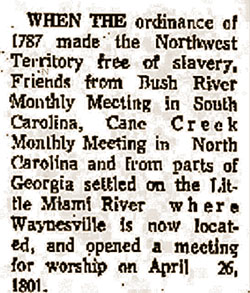The Society of Friends (Quakers)
Cane Creek Monthly Meeting is near Snow Camp, Almance County, North Carolina.
The first Monthly Meeting at Cane Creek was held on October 7, 1751. There were 30 Quaker families in the area.
In 1761 the meeting was divided by a dispute .
Early members included:
Name
From
Notes
Adams, William & Susanna
Aldrage, William
Allen, John & Rachel Stout
Atkinson, John & Mary
Ballenger, Henry and family
Barker, Nicholas
Branson, Thomas
dissenter in dispute
Brown, William & Hannah
Brooks, Matthew & Elizabeth
Buckenham, Joseph
Carter, James
Chambers, Samuel & Sarah
Chamness, Anthony & Sarah Cole Maryland
Chamness, Joshua & Rachel Williams
s. of Anthony Chamness
Cloud, Mary Underwood
Cox, John & Mary
Cox, William and Phebe
dissenters in dispute
Cox, Julitha
dissenter in dispute
Davis, John & Mary Chamness
d. of Anthony Chamness
Dixon, Nathan & Sarah
Dixon, Simon & Elizabeth Allen
Lancaster, Pennsylvania
Dixon, Solomon & Hannah Hunt
Dixon, Thomas & Abigail
Doan, John & Elizabeth Overman
Hadley, Joshua & Patience Brown Chester, Pennsylvania
Hiatt, John
Hiatt, Martha and children
Hinshaw, Benjamin
Hinshaw, Jacob & Rebecca Macky
Hinshaw, Jesse
Hinshaw, Joseph & Margery Kemp
Hinshaw, Thomas
Hinshaw, William
Hornaday Lewis & Rebecca Pike
Husband, Herman and Amy Pugh
disowned for dissent in dispute
Jones, Aaron
Chester, PA
b 1728 30 Jul 1728. son of Richard Jones and Miriam Coppock.
Jones, John and Mary Berks, PA
Jones, Thomas
Kemp, Richard & Susannah
Laughlin, Hugh and Mary
Lindley, Thomas & Ruth Hadley Chester, PA
Long, John & Mary C.
Maddock, Joseph
dissenter in dispute, moved to Wrightsborough
Maris, George & Elenor
Marshall, John & Ruth Hadley
dissenters in dispute, daughter of Joshua Hadley
Marshall, William & Rebecca Dixon
dissenters in dispute
Martin, Benjamin
Martin, Zachariah
Moffit, Mary
dissenter in dispute
Moon, John & Rachel
Knight, Abel and Family Abington
Ozbun, Thomas
Pike, John and Abigail Overman
Powell, John
Reynolds, William and family
Sell, Jonathan
dissenter in dispute, moved to Wrightsborough
Stanfield, John and Hannah Hadley Dixon
Stanfield, John, Jr.
Stanfield, Samuel and Lydia Vernon
Stanfield, Thomas
Stout, Hannah Brown
Stout, Mary Noblett
Stout Peter & Charity
Stout, Peter & Hannah
Stout, Peter & Margaret
Stuart, Jehu
Swainey, Mary
Summers, Robert and family
Taylor, James and Frances
Tidwell, John
Vernon, Isaac and Hannah Townsend
Vestal, Elizabeth and sons, William and Thomas
Wells, Joseph and Charity
Williams, George
Wright, John and Rachel Wells
Chester, PA
Rachel disciplined for speaking out.
In 1764, William Marshall and his wife Rebecca Dixon donated twenty-six acres for the meetinghouse.


